Today we’re continuing our four-part series designed to help you get past the roadblocks and obstacles that hold you back from fully moving into the writing life you want.
(If you haven’t seen the first part, you can take a look at it here.)
My goal for you in this series is to help kick-start the process through a few proven exercises so that your professional writing career takes shape sooner rather than later.
Do these exercises, and you will experience positive results that will make becoming a professional writer more attainable for you.
Today’s exercise worked so well for one of the people in The Writer’s Circle, he was able to write 75,000 words in four months … after struggling with writing for years.
Why I’m taking you through these exercises now
I’m releasing a new product this week – Design Your Writing Life – that’s essentially a step-by-step blueprint for how to go from where you are now to the writing life you’ve always been looking forward to.
It will be available with a special launch discount on Thursday, May 8th, and I wanted to share a few select parts of what I teach inside it so that you can get a taste of what the course is all about.
Your next exercise is below!
Exercise #2 – Break resistance by tricking your brain
We cover a number of “writing myths” in Design Your Writing Life that are the common things that hold people back from developing a consistent writing habit, but one of the common threads in these myths is making the act of writing a bigger deal than it is – and giving your power away by thinking conditions must be ideal – either inside you or in the outside world – in order for you to be “able” to write.
Of course there are some circumstances in which writing is easier than in others – but by no means should they dictate your ability to write in the here and now. But the belief that now – any given now – isn’t the right time to get some writing done is a career killer.
In this exercise you’re going to have the chance to interrupt your normal patterns around writing and sneak in under the radar of any resistance to writing.
All you need to do is this:
- Schedule 5 minutes in the morning to write, and don’t put any expectations on writing well. Then do it again each day.
That’s it. Just 5 minutes, preferably as close to first thing as you can, but if you need to integrate it with your first coffee of the day (or something similar), that can work, too. Just five minutes, at a time you won’t “forget.”
Scheduling it makes all the difference.
This is how Rikard Berguist managed to write 75,000 words in four months and changed his writing life forever. And you can do it, too.
Important Note: The more this idea seems like it won’t work for you, the more likely it is that it is exactly what will change things for you as a writer.
I’ll explain.
Here’s why this works so well to make writing easier for you
The act of taking just five minutes can help you side-step your resistance because your brain won’t quite take the exercise seriously. After all, it’s just five minutes, and it’s in the morning. As far as your brain is concerned, it will be over with soon enough.
It’s almost like it’s not a threat to any ingrained beliefs you have about writing being difficult. (It doesn’t hurt that you’re also not trying to do your “best” writing, so the pressure’s off.)
This does a few things for you:
- One, it breaks your normal expectations around writing – instead of striving to “do it right”, you’re “just doing it.”
- Two, it begins the process of normalization – your brain begins getting comfortable with the idea of writing being a planned part of your daily routine, like a coffee or a shower.
- Three, it helps reinforce your identity as a writer, because it’s something you’re doing more often. Writing will start feeling more like something you “do” rather than something you “should be doing.”
- Four, it can rapidly improve your creativity. David Boice, a well known researcher in the realm of academic writing, has found that writers who write on a daily basis are twice as likely to have frequent creative thoughts as writers who write when they “feel like it.”
- Fifth, it can rapidly improve your skill as a writer. There is mounting evidence to show that “spaced practice” can lead to faster skill building than “massed practice” – meaning that the more little practice sessions you have, the more your brain can strengthen long-term memory associated with the writing process. So those 5 minute sessions each day will trigger and re-trigger the brain to get into “writing mode” more easily over time.
The wonderful side effect of this exercise is that it doesn’t take long for those 5-minute writing bursts to get longer. Without resistance slowing you down, you’ll find yourself wanting to write for 10 minutes, then 15, and beyond. Rikard worked his way up to an hour a day “sneaking under the radar of resistance” and had this to say:
I gave myself permission to write badly. I told myself “I am writing crap,” and suddenly I was writing about 750 words during that hour every morning. And surprise, it wasn’t all crap.
Four months later, he was typing the last words on a completed first draft.
Take 5 minutes now and do this exercise, and let me know how it goes!
Now is as good a time as any to give this exercise a try – just take 5 minutes now to break the ice and see what you can get written – and then decide when you’re going to do your daily 5 minutes from now on. Remember, you’re not going for your “best” writing in this space – we’re simply getting the habit in place.
Writing for 5 minutes won’t feel normal yet. Soon it will, though, and you’ll begin to feel your identity as a writer strengthen and solidify.
Once you’re done, take a moment to tell me how you feel at the end of the exercise! I look forward to cheering you on. :)
So go set your timer, and write!





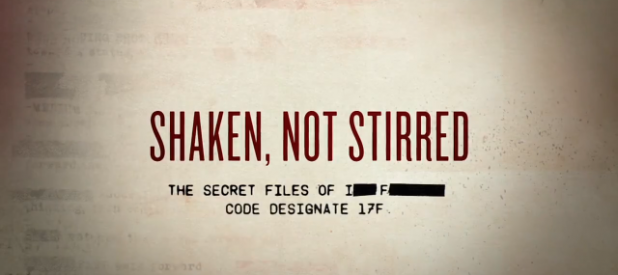
 I had the pleasure of meeting Aaron Cooley earlier this year in Los Angeles and I was instantly intrigued by his story of not only how he came to write his first novel,
I had the pleasure of meeting Aaron Cooley earlier this year in Los Angeles and I was instantly intrigued by his story of not only how he came to write his first novel, 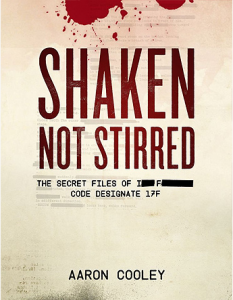 Well, I didn’t intend to write a book at all. I’ve been working in Hollywood in film development and doing some screenwriting on the side for over ten years now. In 2007, while researching a movie I had been hired to rewrite, I came across a little blurb about a World War II-era Yugoslavian spy named Dusko Popov who Ian Fleming had met and upon whom he had probably based aspects of James Bond. (I now know there are dozens of people who have claimed to be his inspiration.) I thought this would make a fantastic buddy spy action film, so I started pitching it around town. What I found was that although no one had explored my particular Popov take on the story, there were already at least 3 or 4 “Young Ian Fleming” projects in development — one of which finally got made for television starring Dominic Cooper and comes out next year. So I put it on the shelf. Two years later, I still couldn’t get the idea out of my head and as I started to notice how popular and successful e-books had suddenly become — I think Wool had just sold to Ridley Scott — I decided to take a crack at it. I always dreamed of being a fantasy novelist when I was a kid and this was my chance to see if I could actually write a book start to finish.
Well, I didn’t intend to write a book at all. I’ve been working in Hollywood in film development and doing some screenwriting on the side for over ten years now. In 2007, while researching a movie I had been hired to rewrite, I came across a little blurb about a World War II-era Yugoslavian spy named Dusko Popov who Ian Fleming had met and upon whom he had probably based aspects of James Bond. (I now know there are dozens of people who have claimed to be his inspiration.) I thought this would make a fantastic buddy spy action film, so I started pitching it around town. What I found was that although no one had explored my particular Popov take on the story, there were already at least 3 or 4 “Young Ian Fleming” projects in development — one of which finally got made for television starring Dominic Cooper and comes out next year. So I put it on the shelf. Two years later, I still couldn’t get the idea out of my head and as I started to notice how popular and successful e-books had suddenly become — I think Wool had just sold to Ridley Scott — I decided to take a crack at it. I always dreamed of being a fantasy novelist when I was a kid and this was my chance to see if I could actually write a book start to finish.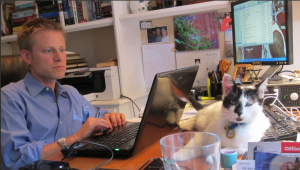 I have a full-time job — but I actually think that’s a good thing for writers. I can only devote two hours a day to writing, but if that’s the only time you have, you really have to be focused in those two hours and it makes you more productive. I think if I had 8 hours I’d still only get 2 or 3 productive hours in each day. I actually set an alarm and turn off email and social media until that alarm goes off. The hardest time to motivate is when you don’t know what your next project is, and you have to spend that 2 hours brainstorming and going through old idea docs and banging your head against your walls. I’ve spent weeks outlining an idea and reading thousands of pages of research on it only to realize, “This isn’t the one.” When you’re supposed to be writing something, you know it. But make sure you pitch it to a couple people early on. To this day, my 3 or 4 best-received scripts (and the novel) are things that I pitched to people early on and kept getting, “Wow, that’s awesome, you’ve got to write that,” as a response.
I have a full-time job — but I actually think that’s a good thing for writers. I can only devote two hours a day to writing, but if that’s the only time you have, you really have to be focused in those two hours and it makes you more productive. I think if I had 8 hours I’d still only get 2 or 3 productive hours in each day. I actually set an alarm and turn off email and social media until that alarm goes off. The hardest time to motivate is when you don’t know what your next project is, and you have to spend that 2 hours brainstorming and going through old idea docs and banging your head against your walls. I’ve spent weeks outlining an idea and reading thousands of pages of research on it only to realize, “This isn’t the one.” When you’re supposed to be writing something, you know it. But make sure you pitch it to a couple people early on. To this day, my 3 or 4 best-received scripts (and the novel) are things that I pitched to people early on and kept getting, “Wow, that’s awesome, you’ve got to write that,” as a response. A former child actor, Aaron Cooley has been living on film sets since the age of three. Upon graduating from Yale, Aaron migrated to Los Angeles, where he has apprenticed under director Joel Schumacher, most recently serving as his head of development and Associate Producer. As a screenwriter, Aaron has developed projects for the companies behind PULP FICTION, TRANSFORMERS, ROCKY, SAW, and THE BREAK-UP, as well as helped create advertising for various MTV Awards Shows and public service campaigns. SHAKEN, NOT STIRRED is Aaron’s first novel.
A former child actor, Aaron Cooley has been living on film sets since the age of three. Upon graduating from Yale, Aaron migrated to Los Angeles, where he has apprenticed under director Joel Schumacher, most recently serving as his head of development and Associate Producer. As a screenwriter, Aaron has developed projects for the companies behind PULP FICTION, TRANSFORMERS, ROCKY, SAW, and THE BREAK-UP, as well as helped create advertising for various MTV Awards Shows and public service campaigns. SHAKEN, NOT STIRRED is Aaron’s first novel.
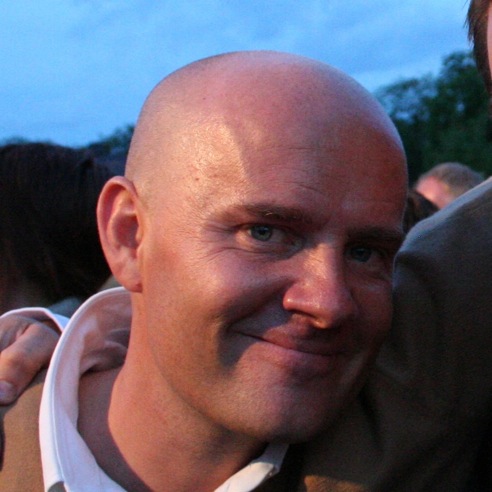 When he joined the Circle all the way from Sweden, Rikard Bergquist had been working on his novel intermittently, struggling to find enough time to write and to move past the outlining and preparation stage into writing actual New Words. And he had a little two-year-old daughter at the time too! (She’s three now.)
When he joined the Circle all the way from Sweden, Rikard Bergquist had been working on his novel intermittently, struggling to find enough time to write and to move past the outlining and preparation stage into writing actual New Words. And he had a little two-year-old daughter at the time too! (She’s three now.)
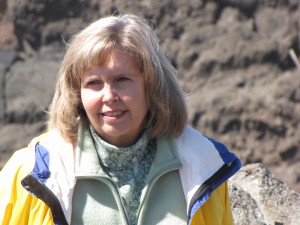 When Mary Montanye joined the Writer’s Circle on a colleague’s recommendation, she was almost done with her memoir — but not quite. She was feeling stuck around moving to the final completion point with the project — a tough moment for any writer — particularly because her memoir would set some deep and personal truths free into the world. We were proud to help her
When Mary Montanye joined the Writer’s Circle on a colleague’s recommendation, she was almost done with her memoir — but not quite. She was feeling stuck around moving to the final completion point with the project — a tough moment for any writer — particularly because her memoir would set some deep and personal truths free into the world. We were proud to help her 




